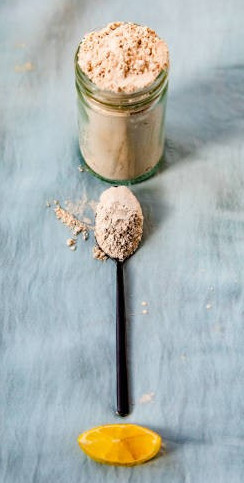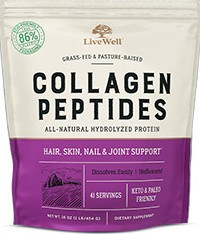The Importance of Collagen in Our Bodies
By about 30 years old our skin begins to lose its elasticity, our joints begin to ache ( some of us a bit older) and we notice our digestion starts to suffer. Collagen is one of the most popular supplements on the market to help with this issue.

What are the benefits of Collagen Peptides?
Collagen holds the body together. It’s the most abundant protein produced naturally in the human body, and a critical component of connective tissue. As you age, your body produces less making it necessary to get it from another source. Collagen is found in skin, hair, nails, bones, joints, muscles, tendons, blood vessels, and vital organs which form a sponge-like matrix in your skin. It absorbs substances like hyaluronic acid and another protein called elastin which keeps skin, smooth, taut, firm, and hydrated. It makes up about 80% of the dry weight of our skin. It can dramatically transform your health and appearance. You need to take the right kind to have the desired effect therefore you must do your due diligence.
The Five Most Common Types of Collagen
Over 90% of the collagen in the body is type 1 collagen. Since 2011 30 types of collagen have been identified and divided into several groups according to the structure they form. The number of types shows collagen’s diverse functions.
According to Wikipedia, the five most common types are:
- Type I: skin, tendons, vasculature, organs, bone (the main component of the organic part of the bone)
- Type II: cartilage (a main collagenous component of cartilage)
- Type III: reticulate (the main component of reticular fibers), commonly found alongside type I
- Type IV: forms basal lamina, the epithelium-secreted layer of the basement membrane
- Type V: cell surfaces, hair, and placenta
Collagen is one of the body’s key natural resources and a component of skin tissue that can benefit all stages of what is called “wound healing.” When collagen is made available to the wound bed, closure can occur. Wound deterioration, followed sometimes by procedures such as amputation, can be avoided. It’s a natural product and is used as a natural wound dressing and has properties that artificial wound dressings do not have. It’s resistant to bacteria which is of great importance in wound dressing. Due to its ability to fight infection, it helps to keep the wound sterile. With the use of collagen as a burn dressing, healthy granulation tissue could form very quickly over the burn, which helps it to heal rapidly.

Cardiac Applications
The collagenous cardiac skeleton which includes the four heart valve rings, is histologically, elastically, and uniquely bound to cardiac muscle. The cardiac skeleton also includes the separating septa of the heart chambers – the interventricular septum and the atrioventricular septum. Collagen contribution to the measure of cardiac performance summarily represents a continuous torsional force opposed to the fluid mechanics of blood pressure emitted from the heart. The collagenous structure that divides the upper chambers of the heart from the lower chambers is an impermeable membrane that excludes both blood and electrical impulses through typical physiological means. With support from collagen, atrial fibrillation never deteriorates to ventricular fibrillation. Collagen is layered in variable densities with smooth muscle mass. The mass, distribution, age, and density of collagen all contribute to the compliance required to move blood back and forth. Individual cardiac valvular leaflets are folded into shape by specialized collagen under variable pressure. Gradual calcium deposition within collagen occurs as a natural function of aging. Calcified points within collagen matrices show contrast in a moving display of blood and muscle, enabling methods of cardiac imaging technology to arrive at ratios essentially stating blood in (cardiac input) and blood out (cardiac output). Pathology of the collagen underpinning of the heart is understood within the category of connective tissue disease.
What are the different types of collagen and their functions?
Powder that has no flavor and dissolves easily in liquid is the best type of collagen peptide.
Hydrolyzed collagen peptides are the best types of collagen. Meaning, when hydrolyzed the amino acids are broken down so that it’s easier for your body to digest. Hydrolyzed collagen comes from a variety of sources such as fish and bovine. It becomes less potent from fish than from bovine (a form of protein derived from cattle, buffalo, and bison). There’s plant collagen available for vegetarians/vegans. Therefore, it’s highly recommended to use hydrolyzed collagen peptides derived from organic grass-fed bovine due to their potency and effectiveness.
About 90% of the collagen in your body is type I, II, and III. They all have different functions and it’s very important to know the difference.
Type I: The most common type found in the skin tendons, ligaments, bones, teeth, and between organs, is also well known for its hair, skin, and nail benefits. It’s a versatile protein that has many benefits for your whole body’s health.
Type II: This type is mostly located in the eyes and cartilage. It’s a very specific type of protein that helps improve your joint health. Since other types of collagen also have benefits for joints, finding a collagen dietary supplement that uses type II is not necessarily vital.
Type III: Found in your skin, muscles, and blood vessels. This type of collagen usually goes alongside type I and they complement each other very well. It’s also known for helping to improve your skin’s elasticity and smoothing fine lines.
The most effective collagen peptides will list both types I and III on the label. Others go overboard and list as many as 5 or more different types of collagen. Having several types of collagen in one dietary supplement will give you less of the few important types that are shown to improve your health.
What is the best type of collagen peptide to use?
Tips to look for when picking collagen peptides:
Diverse Amino Acid Profile
Pasture-Raised Hydrolyzed Collagen From Bovine
Type I and III Collagen
Magnesium
Things to avoid:
- Soy Fillers
- Citric Acid
- Artificial Additives
- Non-hydrolyzed
- Collagen
- Dairy Preservatives
Natural Flavors
If you see “Natural Flavor” on a collagen label “Do not purchase.” These flavors are not natural. They are derived from chemicals found in food and enhanced in a laboratory.
The correct dosage is very important. There are brands that will use quality ingredients but would skim on the dosage to save cost. Although you may be getting the right ingredients, if the recommended dosage is missing then you would not receive the full benefits. Be sure at least 11 grams per serving is on the label.
Live Conscious Collagen is one of the best if not the best collagen supplement. It uses quality ingredients, has a variety of amino acid profiles, uses the best available type I and type III, and hydrolyzed bovine collagen in the recommended dosage.

No harmful chemicals or additives are included. It’s also free from dairy, preservatives, and soy. It dissolves easily and has no flavor. Avoid marine collagen. It could be jellyfish, shellfish, or shark. These sources are difficult for the body to absorb. Artificial flavors or sweeteners could upset your GI tract.
My experience in taking collagen
I recently started taking collagen and I’ve already seen good results. I noticed my hair has gotten thicker no more shedding (thank goodness). My memory seems to be better. I’m thinking more clearly. Let me be clear, however, this does not necessarily mean the same thing would happen to everyone. Each individual is different and reacts differently to different things. I’m simply stating the results I personally saw after taking this supplement for a short period of time.


Licensed Metal Tuna
Soft
Rhode Island
port
Springs
synthesizing
unleash
Concrete
Metal
yellow
Concrete
policy
Beauty
Berkshire
Manager
Soft
Investment
bypass